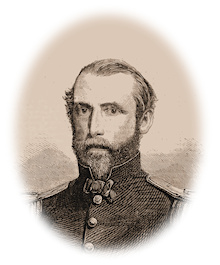April 17.–Arrived in New York.
The following observations may be made upon the bombardment: The enemy’s fire on the second day, the 13th, was more rapid and more accurate than on the previous day. It seemed to be directed at the embrasures, and to set the quarters on fire. The latter object was fully attained, but not the former, for only two embrasures were struck–one at the right gorge angle by the rifled shot mentioned above, and the other at the left shoulder angle by a shot from the so-called floating battery, which struck the shutter, but without destroying it or entering the throat of the embrasure. The attempt to form a breach at the right gorge angle only succeeded in breaching around one embrasure to the depth of twenty-two inches, and in knocking off a large piece of one cheek, but without disabling the gun or rendering the embrasure inefficient. The barbette tier was not much injured by the second day’s firing, none of the guns being dismounted by it; and few of them struck. The fire, however, destroyed all the gun carriages and splinter-proof shelters on the gorge.
After the cessation of fire, about six hundred shot-marks on the face of the scarp wall were counted, but they were so scattered that no breached effect could have been expected from such fire, and probably none was attempted except at the right gorge angle. The only effect of the direct fire during the two days was to disable three barbette guns, knock off large portions of the chimneys and brick walls projecting above the parapet, and to set the quarters on fire with hot shot. The vertical fire produced more effect, as it prevented the working of the upper tier of guns, which were the only really effective guns in the fort, being columbiads, 8-inch sea-coast howitzers, and 42-pounders principally, and also prevented the use of the columbiads arranged in the parade to be used as mortars against Cummings Point. The shells that struck the stair towers nearly destroyed them, and filled the stairways with so much rubbish as to render them almost impassable. This, with the destruction of the stairs at the gorge by the explosion of the magazine of shells by the fire, made it almost impossible to get to the terre-plein.
The burning of the quarters and barracks produced a great effect on the defense while the fire lasted, inasmuch as the heat and smoke were almost stifling, and as the fire burned all around the magazines, obliging them to be closed, and thus preventing our getting powder to continue the firing. It also destroyed the main gates and the gun carriages on the parapet of the gorge. But we could have resumed the firing as soon as the walls cooled sufficiently to open the magazines, and then, having blown down the wall left projecting above the parapet, so as to get rid of flying bricks, and built up the main gates with stones and rubbish, the fort would actually have been in a more defensible condition than when the action commenced. In fact, it would have been better if the chimneys, roofs, and upper walls of the quarters and barracks had been removed before the firing begun, but the short notice and the small force did not permit anything of this kind to be done after the notice of the attack was received.
The weakness of the defense principally lay in the lack of cartridge bags, and of the materials to make them, by which the fire of our batteries was, all the time, rendered slow, and towards the last was nearly suspended. The lack of a sufficient number of men to man the barbette tier of guns at the risk of losing several by the heavy vertical fire of the enemy also prevented us making use of the only guns that had the power to smash his iron-clad batteries, or of throwing shells into his open batteries, so as to destroy his cannoneers.
The want of provisions would soon have caused the surrender of the fort, but with plenty of cartridges the men would have cheerfully fought five or six days, and if necessary much longer, on pork alone, of which we had a sufficient supply.
I do not think that a breach could have been effected in the gorge at the distance of the battery on Cummings Point, within a week or ten days; and even then, with the small garrison to defend it, and means for obstructing it, at our disposal, the operation of assaulting it, with even vastly superior numbers, would have been very doubtful in its results.
Respectfully submitted.
J. G. FOSTER,
Captain, Engineers.
